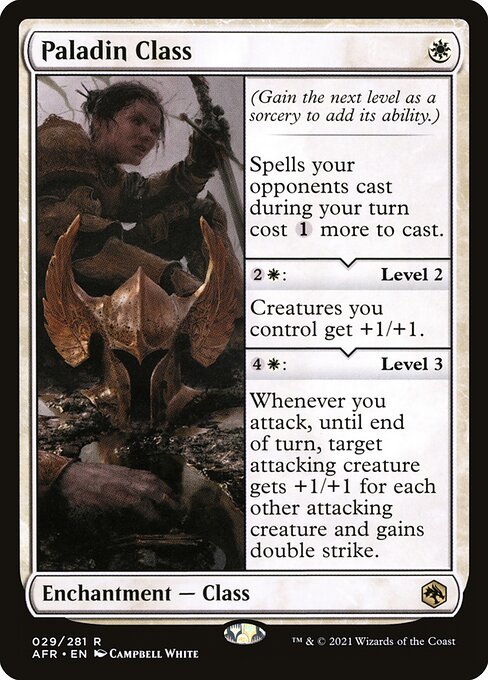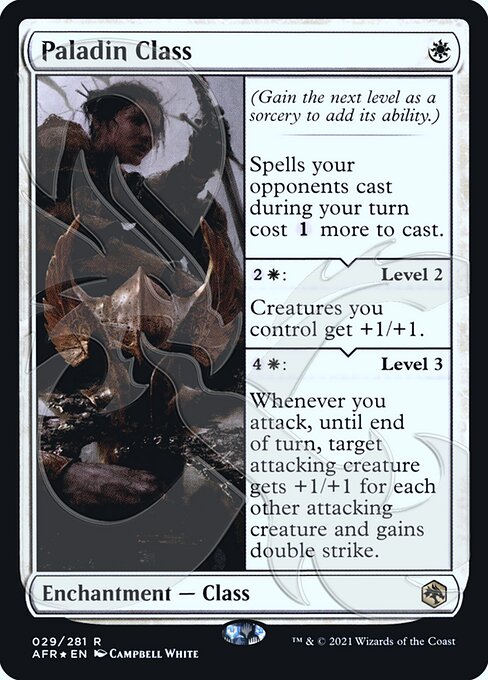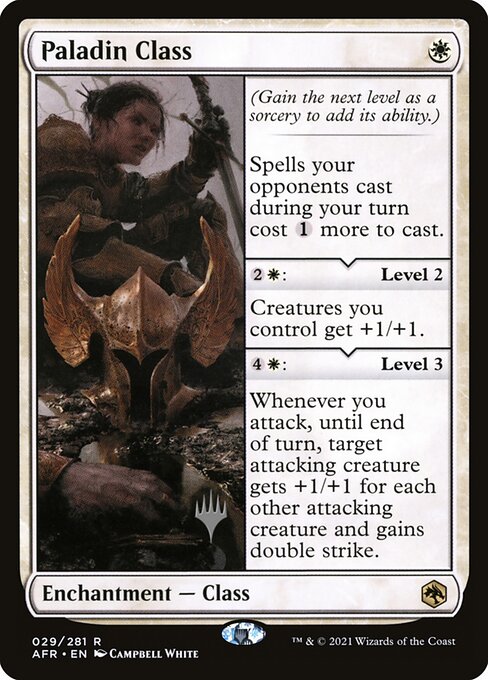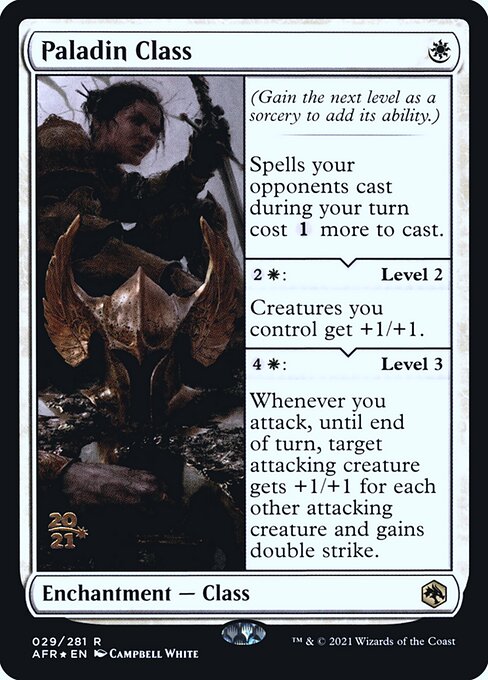Classe : paladin
Enchantement : classe
(Acquérez le prochain niveau lorsque vous pourriez lancer un rituel pour ajouter sa capacité.)
Les sorts que vos adversaires lancent pendant votre tour coûtent de plus à lancer.
: Niveau 2
//Level_2//
Les créatures que vous contrôlez gagnent +1/+1.
: Niveau 3
//Level_3//
À chaque fois que vous attaquez, jusqu'à la fin du tour, une créature attaquante ciblée gagne +1/+1 pour chaque autre créature attaquante et acquiert la double initiative.
Les sorts que vos adversaires lancent pendant votre tour coûtent de plus à lancer.
: Niveau 2
//Level_2//
Les créatures que vous contrôlez gagnent +1/+1.
: Niveau 3
//Level_3//
À chaque fois que vous attaquez, jusqu'à la fin du tour, une créature attaquante ciblée gagne +1/+1 pour chaque autre créature attaquante et acquiert la double initiative.
standard
future
historic
gladiator
pioneer
explorer
modern
legacy
pauper
vintage
penny
commander
brawl
alchemy
paupercommander
duel
oldschool
premodern
Rulings
Each Class starts with only the first of three class abilities. As the first level ability resolves, the Class becomes level 2 and gains the second class ability. As the second level ability resolves, the Class becomes level 3 and gains the third class ability.
Additional costs from Paladin Class cards are cumulative. For example, if you control two Paladin Class cards, spells your opponents cast cost more to cast.
You can multiclass or even control multiple Class enchantments of the same class. Each Class permanent tracks its own level separately.
If Paladin Class is level 3 and you attack with exactly one creature, it won't get a power and toughness bonus, but it will get double strike.
Some Class cards have an effect that increases when more are under your control. For example, if you have multiple Barbarian Class cards, you roll that many additional dice and ignore that many of the lowest rolls.
Each Class has five abilities. The three in the major sections of its text box are class abilities. Class abilities can be static, activated, or triggered abilities. The other two are level abilities, one activated ability to advance the Class to level 2 and another to advance the Class to level 3.
Gaining a level won't remove abilities that a Class had at a previous level.
You can't activate the first level ability of a Class unless that Class is level 1. Similarly, you can't activate the second level ability of a Class unless that Class is level 2.
Gaining a level is a normal activated ability. It uses the stack and can be responded to.
Additional costs from Paladin Class cards are cumulative. For example, if you control two Paladin Class cards, spells your opponents cast cost more to cast.
You can multiclass or even control multiple Class enchantments of the same class. Each Class permanent tracks its own level separately.
If Paladin Class is level 3 and you attack with exactly one creature, it won't get a power and toughness bonus, but it will get double strike.
Some Class cards have an effect that increases when more are under your control. For example, if you have multiple Barbarian Class cards, you roll that many additional dice and ignore that many of the lowest rolls.
Each Class has five abilities. The three in the major sections of its text box are class abilities. Class abilities can be static, activated, or triggered abilities. The other two are level abilities, one activated ability to advance the Class to level 2 and another to advance the Class to level 3.
Gaining a level won't remove abilities that a Class had at a previous level.
You can't activate the first level ability of a Class unless that Class is level 1. Similarly, you can't activate the second level ability of a Class unless that Class is level 2.
Gaining a level is a normal activated ability. It uses the stack and can be responded to.
Rulings
Each Class starts with only the first of three class abilities. As the first level ability resolves, the Class becomes level 2 and gains the second class ability. As the second level ability resolves, the Class becomes level 3 and gains the third class ability.
Additional costs from Paladin Class cards are cumulative. For example, if you control two Paladin Class cards, spells your opponents cast cost more to cast.
You can multiclass or even control multiple Class enchantments of the same class. Each Class permanent tracks its own level separately.
If Paladin Class is level 3 and you attack with exactly one creature, it won't get a power and toughness bonus, but it will get double strike.
Some Class cards have an effect that increases when more are under your control. For example, if you have multiple Barbarian Class cards, you roll that many additional dice and ignore that many of the lowest rolls.
Each Class has five abilities. The three in the major sections of its text box are class abilities. Class abilities can be static, activated, or triggered abilities. The other two are level abilities, one activated ability to advance the Class to level 2 and another to advance the Class to level 3.
Gaining a level won't remove abilities that a Class had at a previous level.
You can't activate the first level ability of a Class unless that Class is level 1. Similarly, you can't activate the second level ability of a Class unless that Class is level 2.
Gaining a level is a normal activated ability. It uses the stack and can be responded to.
Additional costs from Paladin Class cards are cumulative. For example, if you control two Paladin Class cards, spells your opponents cast cost more to cast.
You can multiclass or even control multiple Class enchantments of the same class. Each Class permanent tracks its own level separately.
If Paladin Class is level 3 and you attack with exactly one creature, it won't get a power and toughness bonus, but it will get double strike.
Some Class cards have an effect that increases when more are under your control. For example, if you have multiple Barbarian Class cards, you roll that many additional dice and ignore that many of the lowest rolls.
Each Class has five abilities. The three in the major sections of its text box are class abilities. Class abilities can be static, activated, or triggered abilities. The other two are level abilities, one activated ability to advance the Class to level 2 and another to advance the Class to level 3.
Gaining a level won't remove abilities that a Class had at a previous level.
You can't activate the first level ability of a Class unless that Class is level 1. Similarly, you can't activate the second level ability of a Class unless that Class is level 2.
Gaining a level is a normal activated ability. It uses the stack and can be responded to.
Votre collection ? vos decks ?
Envie de gérer votre collection et/ou créer des decks ?


 0
0
 0.31€
0.31€


